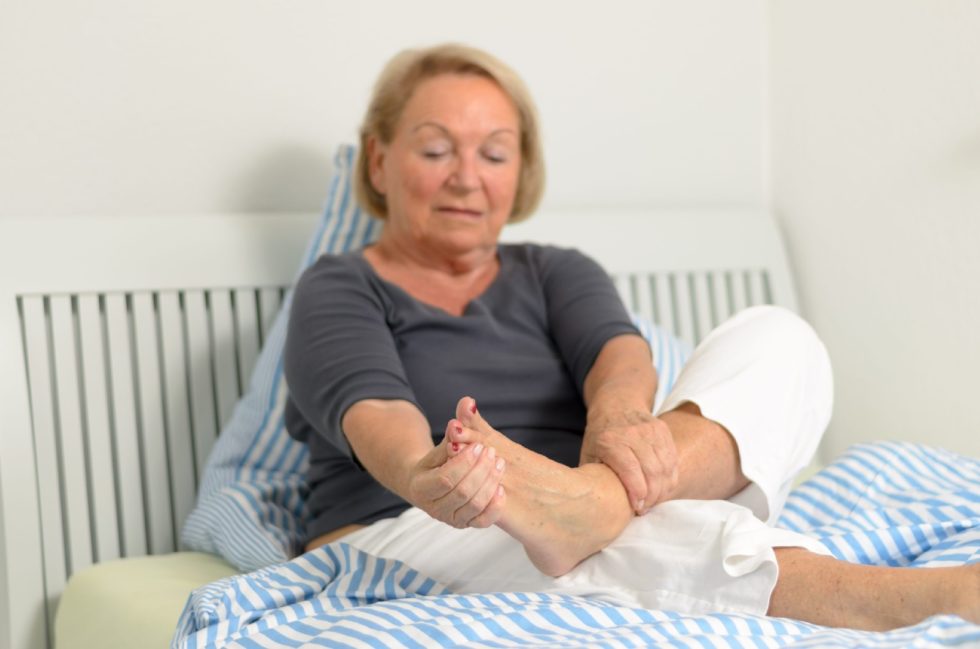12 Tips to Care for Diabetic Feet and Avoid Foot Ulcers
Author: StrideCare Internal Team

Patients with diabetes are more susceptible to foot problems due to complications from the disease. One of the most common foot problems for diabetic feet are foot ulcers. If left untreated, these ulcers can become infected and, in the worst-case scenario, the toes and/or foot will require amputation. However, with the right diabetic foot care, ulcers and infections can be prevented.
Why Diabetic Feet Get Ulcers
First, it’s important to understand why diabetes increases the occurrence of foot ulcers that can become infected.
- High blood sugar levels cause veins to narrow and stiffen, limiting the blood flow throughout the body, especially the extremities.
- Diabetics have an increased risk of peripheral arterial disease (PAD), which further restricts blood flow and circulation to the lower parts of the body, namely the legs and feet. Without proper circulation, the body’s ability to heal is reduced.
- Diabetic neuropathy, or nerve damage, can cause a loss of feeling in the feet. Without sensation, it is difficult to feel pain if there is a cut, blister, or other damage to diabetic feet. If not recognized, the damage can go untreated and lead to infection.
- The immune systems of diabetics can be slowed, affecting the body’s ability to fight infection. This is two-fold. A person with diabetes is more prone to get infections, and once the infection occurs, it is also more difficult to rid the body of the infection.
Caring for Diabetic Feet to Prevent Foot Ulcers
Diabetic feet require daily care. Here are 12 tips for diabetic foot care to prevent ulcers:
- Check your feet daily.
Inspect diabetic feet for cuts, blisters, redness, swelling, or any type of wound. If it is difficult to see your entire foot, try using a mirror or asking a family member to help.
- Wash your feet daily.
Use a mild soap and lukewarm water. Gently dry them with a towel, paying extra attention to between the toes. If needed, moisturize the tops and bottom of your feet, but do not moisturize between your toes to avoid the growth of bacteria.
- Wear socks and shoes.
If you walk around barefoot, you run the risk of stepping on something sharp. If you have neuropathy, you will not know if you are injured. Before putting your shoes on, make sure that no objects have fallen inside that could hurt you.

- Choose the right shoes.
Avoid heels, pointed toes, and ill-fitting shoes that can cause blisters. Shoes should have closed toes to protect your feet from injury, and be made of natural, breathable materials like leather and canvas.
- Protect your diabetic feet from extreme temperatures.
Test water temperature before washing, and wear shoes on hot pavement. If it gets cold, wear socks when sleeping.
- Check your toenails weekly.
Keep them properly trimmed—straight across.
- Keep blood flowing.
Elevate your feet up when possible, wiggling your toes, and not crossing your legs for an extended period of time.

- Don’t smoke.
Smoking can affect circulation and blood flow.
- Manage your diabetes.
Take your medications and checking your blood sugar, blood pressure and cholesterol levels regularly.
- Exercise and eat healthy foods.
- Have your feet thoroughly examined by your doctor at least once a year.
- This is the most important tip of all!
If your diabetic feet show any changes or symptoms that cause concern, visit your doctor as soon as possible. Early intervention and medical care can prevent ulcers and infection
Schedule an Appointment with StrideCare
Are you concerned about diabetic feet and diabetes leading to further vascular and vein issues? Are you experiencing a diabetic foot ulcer, sore or wound? StrideCare can help. The expert doctors and caring staff utilize the latest technologies and minimally invasive procedures to treat underlying conditions that can lead to diabetic feet ulcers. The vascular physicians at StrideCare are board certified diagnostic radiologists with additional fellowship training in vascular and interventional radiology.
Prior to starting any new treatment or questions regarding a medical condition, always seek the advice of your doctor or other qualified health provider. This information is not a substitute for professional medical advice.
StrideCare serves the South Texas area including Houston, San Antonio, Austin, Round Rock, Bastrop, Brushy Creek, Cedar Park, Converse, Georgetown, Hutto, Kyle, Leander, Marble Falls, New Braunfels, Pasadena, Pearland, Pflugerville, San Marcos, Schertz, Houston, Sugar Land, Katy, Webster, Bay City, Clear Lake, Lake Jackson, The Woodlands, Universal City, Spring, Kingwood, Stafford, Conroe, Texas City, Cypress, League City, Bellaire, and more.


